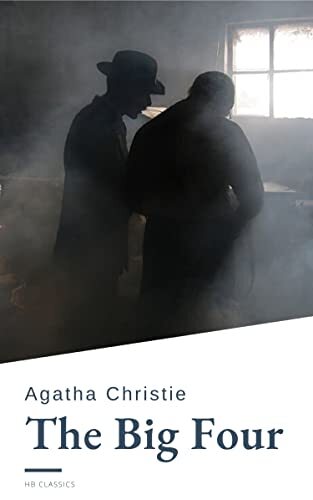The Big Four

A review of The Big Four by Agatha Christie – 230404
Sometimes I wonder if I am missing something with Agatha Christie. OK, I understand that she is the best selling novelist of all time and regarded as the doyenne of crime fiction and that if popularity is any judge she is the bee’s knees, but if I had known that this book had been written by anyone other than her, I would have given into my desire to delete it from my Kindle after the opening couple of questions. Because of her reputation, I persevered, expecting that it would get better, but the only moment of relief came when I reached the end and moved on to another book.
Originally published in 1927, The Big Four is the fifth outing for Hercule Poirot and sees him reunited with his faithful Watson-like Hawkins, who narrates the madcap adventure, having returned, temporarily, from his sojourn in the Argentine, where he has picked up a wife. However, he is happy to leave her behind and only gives her a thought when he hears that she has been kidnapped when, ludicrously, he is prepared to lay down his life to save her. His role in this novel is to be Poirot’s foil, his bumbling nature, his impetuousness, and his unerring knack of picking up a vital clue but failing to realise its significance a counterpoint to the brilliance and incisive of the Belgian’s little grey cells.
Crime fiction can be so much more than a murder in a locked country house room, and I am all very much in favour of a writer who is prepared to challenge its conventions and experiment with form and content. Veering off the tried and tested is a risk for writers, increasing the chance of failure, but the rewards can be great. In this book Christie is not content with confronting Poirot with a baffling set of circumstances, challenging him to make sense out of a series of events that mystify the police. Here his mission is to save the world.
In what can best be described as a thriller, Poirot’s foes are the Big Four, a group of evil individuals, who, rather like the shady Illuminati, have only one objective – to dominate the world and subvert its institutions for their evil designs. We know the identity of one, Li chang Yen, a Chinese mastermind and that the second is probably an American and the third a French woman. The fourth is even more mysterious but is the group’s enforcer with an amazing knack to change his appearance convincingly to ensure that he can dispose of foes without detection.
In what is little more than a series of adventures, held together loosely by the overriding theme of hunting the Big Four – it came as no surprise to learn that each, initially, was a short story on its own – Poirot slowly but surely comes closer to establishing the identity of the fiends. The American is the fabulously wealthy financier Abe Ryland while the French woman turns out to be a world-famous scientist, said to be greater than the Curies, Madame Olivier. The fourth is a bit-part actor, Claude Darrell, a master of disguise and the group’s muscle. Although he can play his parts to perfection, he cannot disguise a tic, a compulsion to play with a piece of bread while at the dining table. This tic, of course, gives him away.
Poirot slowly gets closer to understanding who the group are and their motivations, but in every encounter the Big Four, to Hawkins’ growing frustration, seem to come off best. Hawkins is kidnapped a couple of times and in one incident Poirot appears to be killed. No such luck, but the stratagem of faking his death lulls the group into a false sense of security and they are lulled into the Belgian’s trap.
It is all nonsense, of course, and Christie, having built up the character of Poirot in her earlier books as a preening, eccentric, social gadfly with a keen and annoying eye for detail, fails to convince that he is a superman in whom the world can entrust its safety. One interesting snippet was that part of the threat to the world was a weapon harnessing nuclear fusion, an illuminating and prescient pointer to the fear that has stalked the world since the end of the Second World War.
The best I can say for this book is that Christie tried but failed.



